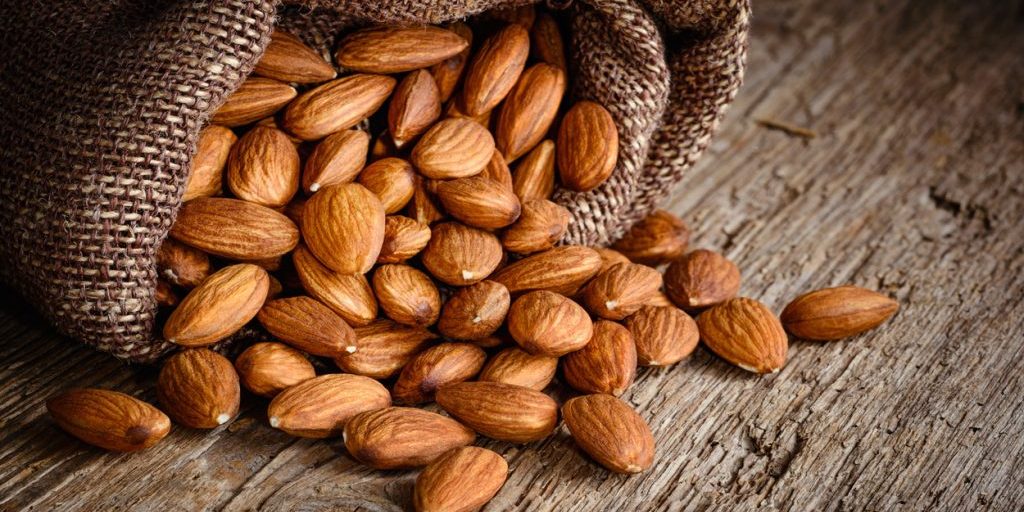The health benefits of almonds
Almonds contain vitamins, minerals, protein, and fiber, and so they may offer a number of health benefits. Just a handful of almonds — approximately 1 ounce — contains one-eighth of a person’s daily protein needs.
People can eat almonds raw or toasted as a snack or add them to sweet or savory dishes. They are also available sliced, flaked, slivered, as flour, oil, butter, or almond milk.
People call almonds a nut, but they are seeds, rather than a true nut.
Almond trees may have been one of the earliest trees that people cultivated. In Jordan, archaeologists have found evidence of domesticated almond trees dating back some 5,000 years.
In this article, find out some of the reasons for almonds being a healthful choice.
1) Almonds and cholesterol

Almonds are high in fat, but it is unsaturated fat. This type of fat does not increase the risk of low-density lipoprotein (LDL) or “bad” cholesterol.
In moderation, the American Heart Association (AHA) note that unsaturated fats may improve a person’s blood cholesterol status.
In addition, almonds contain no cholesterol.
A study from 2005 suggests that consuming almonds may:
- increase vitamin E levels in the plasma and red blood cells
- lower overall cholesterol levels
According to these researchers, vitamin E is an antioxidant that can help stop the oxidization process that causes cholesterol to clog the arteries.
Further studies have found similar results.
Authors of a 2018 review note that the nutrients in almonds may help boost or maintain levels of high-density lipoprotein (HDL) or “good” cholesterol. They advised people to consume around 45 grams (g) a day of almonds to protect heart health.
Which foods should you eat and avoid if you have high cholesterol? Click here for some tips.
2) Almonds and cancer risk
A 2015 study looked at nut consumption and cancer risk.
The authors identified a two to three times lower risk of breast cancer among individuals who consumed higher quantities of peanuts, walnuts, and almonds, compared with those who did not.
They concluded that “peanuts, walnuts, and almonds appear to be a protective factor for the development of breast cancer.”
Is there a link between diet and cancer? Find out here.
3) Almonds and heart disease
Almonds, along with other nuts and seeds, may help improve lipid, or fat, levels in the blood. This can benefit heart health.
In a study from 2014, scientists found that almonds significantly increased the levels of antioxidants in the bloodstream, reduced blood pressure, and improved blood flow. The participants were all healthy males from 20–70 years of age who took 50 g of almonds per day for 4 weeks.
The researchers believe this may be due to:
- vitamin E, healthy fats, and fiber, which help a person feel full
- the antioxidant impact of flavonoids
They recommend eating a handful of almonds a day to obtain these benefits.
High blood pressure increases the risk of heart disease. Which foods can help a person lower their blood pressure?
4) Almonds and vitamin E
Almonds contain relatively high levels of vitamin E. Vitamin E contains antioxidants, such as tocopherol. One ounce (28.4 g) of plain almonds provides 7.27 milligrams (mg) of vitamin E, which is around half a person’s daily requirement.
Vitamin E and other antioxidants help prevent oxidative damage in the body. This damage can occur when too many free radicals accumulate.
Free radicals result from natural bodily processes and environmental stresses. The body can eliminate many of them, but dietary antioxidants help remove them, too. High levels of free radicals can cause oxidative stress, resulting in damage to cells. This can lead to various diseases and health problems.
Scientists have also tentatively linked a higher vitamin E intake with a lower risk of Alzheimer’s disease.
A 2016 review notes that one antioxidant in vitamin E, alpha-tocopherol, may play a role in reducing the risk of cancer. However, more studies are needed to confirm this as findings have been contradictory overall.
Find out which other foods are a good source of vitamin E.
5) Almonds and blood sugar
There is some evidence that almonds may help manage blood sugar levels.
Many people with type 2 diabetes have low magnesium levels. A deficiency is common among those who have difficulty managing their blood sugar levels. Scientists have suggested there may be a link between magnesium deficiency and insulin resistance.
In a 2011 study, 20 people with type 2 diabetes ate 60 g of almonds a day for 12 weeks. Overall, they saw improvements in:
- blood sugar levels
- blood lipid, or fat, levels
One ounce of almonds provides 76.5 mg of magnesium, or between 18% and 24% of an adult’s daily requirement.
Some experts suggest using magnesium supplements to improve blood sugar profiles, but almonds may offer a suitable dietary source instead.
Learn more about how nuts may help people with diabetes.
6) Almonds help manage weight
Almond are low in carbohydrates but high in protein, healthful fats, and fiber.
According to research appearing in 2015, eating almonds as a mid-morning snack can leave a person feeling full for some time. People consumed either 28 g (173 calories) or 42 g (259 calories). The extent to which the participants’ appetites remained low was dependent on the quantity of almonds they consumed.
Feeling full can help people lose weight, as they will be less tempted to seek more snacks.
Nuts often feature in breakfast cereal. What other breakfast foods can help a person feel full?
7) Almonds boost bone health
Almonds contain calcium, magnesium, manganese, copper, vitamin K, protein, and zinc, all of which contribute to bone health.
Experts have recommended almonds as a way to obtain some of these nutrients.
What are some other ways to improve bone strength? Find out here.
Credit :www.medicalnewstoday.com

